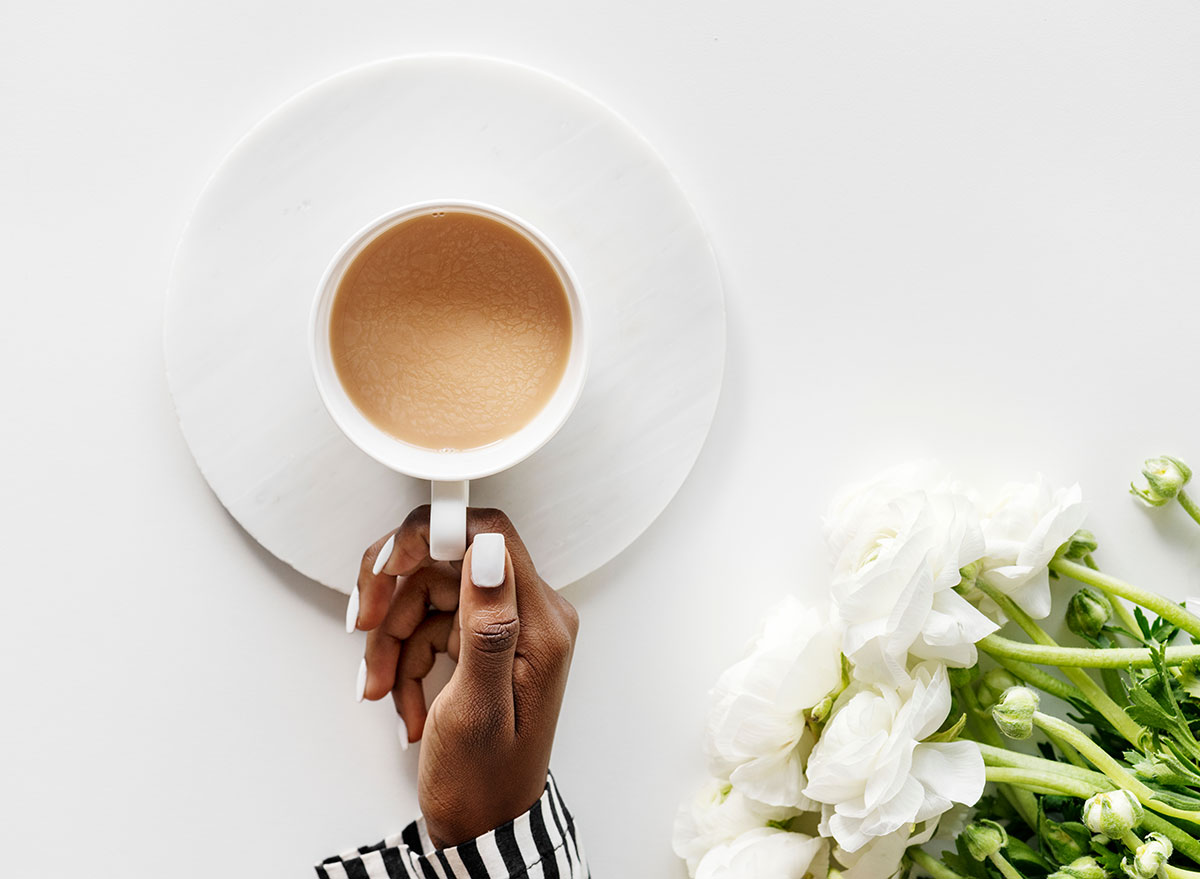What Happens To Your Body When You Drink Decaf Coffee

If you are concerned with the amount of caffeine in your daily diet, you may consider switching from regular to decaf coffee. Though there are pros and cons to both, being decaf alone doesn't make your daily brew better for you, according to nutrition expert and author Dr. Josh Axe. In fact, decaf still has a slight amount of caffeine in it since the extraction process—whether from water, solvent, or carbon dioxide—can't remove every last bit. Here, we talked with experts to understand what happens to your body when you drink decaf coffee, and for more healthy tips, be sure to check out our list of The 7 Healthiest Foods to Eat Right Now.
You might be hungrier.

Nutrition expert and founder of The Food Freedom Society, Hannah Thalberg, says caffeine acts as a natural appetite suppressant. This means you can include it as a snack or an energy boost that will distract you from mindless eating. It's also a natural metabolism booster, making it ideal if you want to jumpstart weight loss. However, without the caffeine, you don't get these benefits, and you may still feel hungry after drinking it.
Here are the Expert-Approved Appetite Suppressants That Totally Work.
Your risk of certain diseases and disorders may decrease.

Registered dietitian Dr. Divya L. Selvakumar, Ph.D., RD, says one of the positive effects of enjoying decaf cups of joe is the fact they can help reduce liver disorders. These include the risk of type 2 diabetes and excessive enzymes in our liver, which adds more of a protective layer for this all-important organ. She also notes decaf coffee can help combat neurodegenerative diseases such as Alzheimer's disease and dementia later in life.
You gain the benefits of antioxidants.

Dr. Selvakumar also says decaf offers antioxidants, which destroy free radicals and harmful substances that can cause cancer, inflammation, and oxidative damage in the body. Plus, small quantities of vitamin B3, magnesium, and potassium are also present when you drink decaf coffee, all of which add wellness, balance, and health to our lifestyles.
Here's Why You Need Antioxidants In Your Diet—And How To Eat More Of Them.
You won't have as much anxiety or tummy issues.

Though decaf has slightly fewer nutrients than regular coffee, Thalberg says it could be more beneficial for those with anxiety or digestive issues. Caffeine can upset your stomach or make you more frequent, resulting in an uncomfortable feeling. And if you have anxiety or heart issues, your doctor will probably recommend avoiding caffeine since it can cause peaks and crashes.
Here are Side Effects of Drinking Caffeine, According to Science.
You could feel more tired or nauseous…

…but only for a short period when we're switching over from regular coffee. As Thalberg explains, our bodies will go through a withdrawal.
"For those who are heavily reliant on caffeine, this can lead to headaches, dizziness, and fatigue," she says. "Another reason for this could be the chemical methylene chloride that is used in the decaffeination process. The methylene chloride that gets released can temporarily slow down the nervous system, leading to the above symptoms."
However, Thalberg notes this experience is not common and should not be very severe unless you are also going through caffeine withdrawal. Here's What Happens to Your Body When You Cut Out Caffeine.
You still need to drink more water.

When you're a coffee drinker, you know how important it is to drink water so you don't become dehydrated. This is still true with decaf varieties, chef Christina Pirello reminds.
"It's very astringent, resulting in dehydration, so if you're drinking coffee, you need to match it with lots of water to protect your kidneys and adrenals from overwork and the resulting 'fatigue,'" she says. "When people drink a lot of coffee, decaf or not, the kidneys are battered from dehydration, and the adrenals are brought into the picture to support the function of the kidneys."
You could sleep better.

Thalberg says decaf coffee is shown to maintain one's natural circadian sleep rhythms, whereas caffeine is known to disrupt it.
"When someone does not drink caffeine, their body naturally produces a chemical known as adenosine throughout the day which gradually accumulates and causes you to feel tired at the end of the day," she says. "Decaf coffee will keep this process intact, letting you reach REM sleep and have a healthy night's sleep."
For even better sleep, here are 7 Healthy Diet Changes That Help You Sleep.








